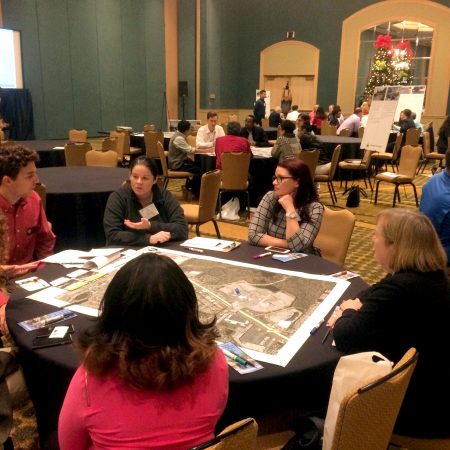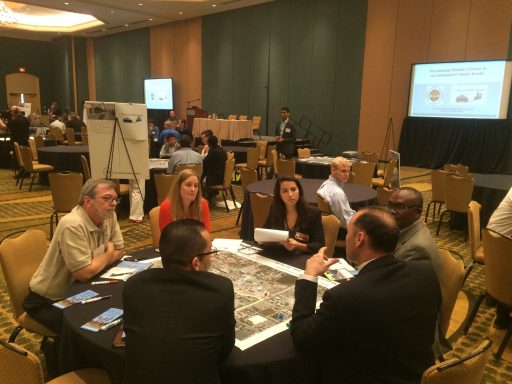
A group of graduate students from the Florida State University Department of Urban and Regional Planning (URP) will receive the Student Project Award from the Florida Chapter of the American Planning Association (APA) in September.
It is the fifth time a student-planning project at Florida State University has won the award since the state APA began presenting them in 2009.
“The fact this department has repeatedly been recognized for their student planning projects shows a true commitment to excellence and innovative thinking at FSU,” said URP Professor Tim Chapin, interim dean of the College of Social Sciences and Public Policy, which houses the department.
The project, “Envisioning Florida’s Future: Transportation and Land Use in an Automated Vehicle World,” was conducted by a team of 13 graduate students in the department’s Florida Planning and Development Lab under the direction of URP Planner-in-Residence Lindsay Stevens. It envisions the future of Florida with the use of automated vehicles (AV) becoming widespread.
The study is part of the Florida Department of Transportation’s ongoing research on automated vehicles, which includes a grant of more than $300,000 to URP in 2014 to study how “robot car” technologies could enhance mobility for aging populations and the transportation disadvantaged.
The students identified policy decisions and infrastructure investments necessary to guide the transition to a transportation system dominated by AVs after conducting a visioning session at the 2015 Florida AV Summit hosted by the Florida Department of Transportation.

The summit gathered planners, engineers, elected officials and AV-industry professionals to brainstorm about how AVs could reshape the environment and transform Florida’s communities. The students ran visioning exercises based on table games they created to immerse participants in what the urban environment might look like when self-driving vehicles become a reality.
Following the AV summit, the student team applied qualitative social science research methods to transcribe, code and analyze the feedback received from the discussion to develop clear visions for how AVs would impact the form and function of right-of-ways, access management, signage/signalization, parking and opportunities for redevelopment. The student team then recommended steps that state and local agencies could take to leverage AV technology.
The study was written by Stevens, Chapin and Senior Planner Jeremy Crute. It outlines a transformative vision of how AVs could reshape urban spaces to be more attractive and people friendly with a safer and more efficient transportation system.
Student authors included: V. Christiansen, John Cowart, Jordan Crandall, William Crowley, Scott Dogali, Diana Elsner, Maverick Fitzgeral, Julian Marcos, Stephano Miranda, Joshua Pelfrey, Yes Segura, Leslie Stout and Alexandria Washington.
In nominating the project to the APA, Jeffery Brown, professor and chair of the Department of Urban and Regional Planning, said, “By providing preliminary guidance for policy decisions and infrastructure investments to capitalize on AVs’ potential to improve the form and function of the built environment, this student-led project has the potential to shape the direction of planning efforts in the state of Florida for decades to come.”
According to the study’s findings, automated vehicles would allow reduction and narrowing of traffic lanes, create convenient drop-off lanes close to destinations, decrease the need for parking lots, improve the lives and mobility of transportation-disadvantaged populations such as aging and disabled adults, and improve the safety of pedestrians and cyclists.
Florida Planning and Development Lab is a nationally recognized place-based learning studio that draws upon academic and professional resources to provide innovative planning for the sustainable growth and long-term viability of communities. While working toward their master’s degrees, students in each semester-long studio course provide technical assistance and capacity to public and private partners throughout the state.
The quality of the work and the valuable contributions to community partners have brought the lab numerous awards from the APA, including Student Project Awards for 2009, 2012, 2013 and 2015.
To read the report, visit floridaplanning.org. For more information about FPDL, visit fpdl.coss.fsu.edu.



